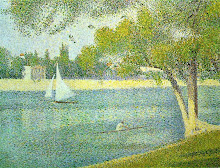 Dear Colonel Brandon comforts Marianne, she is recovering from an illness brought upon her by a broken heart after she has been slighted by the libertine, Willoughby. Here Colonel Brandon reads to her as she convalesces ... the poem he has chosen is Edmund Spenser's the Faerie Queene, the verses he has chosen are as follows:
Dear Colonel Brandon comforts Marianne, she is recovering from an illness brought upon her by a broken heart after she has been slighted by the libertine, Willoughby. Here Colonel Brandon reads to her as she convalesces ... the poem he has chosen is Edmund Spenser's the Faerie Queene, the verses he has chosen are as follows:What though the sea with waves continuall
Doe eate the earth, it is no more at all ...
Nor is the earthe the lesse, or loseth ought.
For whatsoever from one place doth fall,
Is with the tide unto another brought ...
'For there is nothing lost, but may be found, if sought ...'
Doe eate the earth, it is no more at all ...
Nor is the earthe the lesse, or loseth ought.
For whatsoever from one place doth fall,
Is with the tide unto another brought ...
'For there is nothing lost, but may be found, if sought ...'
In the film, Sonnet 116 was the favourite of Marianne and John Willoughby , she recites it when she searches for Willoughby in the pouring rain and with a broken heart and spirit when she finds that Willoughby due to his financial troubles has chosen another, someone of a much higher class and wealth ... that he did not love her enough ... that there was just not enough love to induce him to choose her ... ♥
Sonnet 116
Let me not to the marriage of true minds
Admit impediments. Love is not love
Which alters when it alteration finds,
Or bends with the remover to remove:
O no! it is an ever-fixed mark
That looks on tempests and is never shaken;
It is the star to every wandering bark,
Whose worth's unknown, although his height be taken.
Love's not Time's fool, though rosy lips and cheeks
Within his bending sickle's compass come:
Love alters not with his brief hours and weeks,
But bears it out even to the edge of doom.
If this be error and upon me proved,
I never writ, nor no man ever loved.
William Shakespeare


























































































